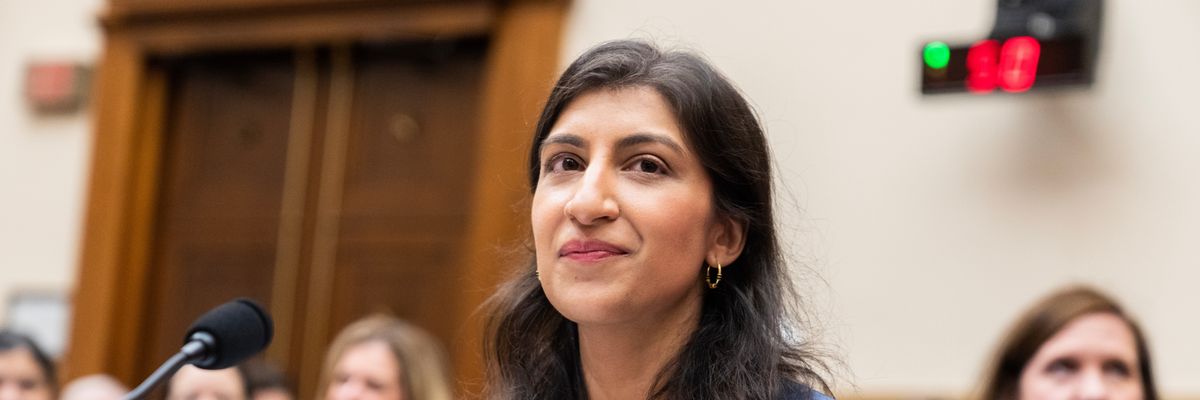
FTC Chair Lina Khan prepares to testify during a House Judiciary Committee hearing on July 13, 2023.
Biden's New Merger Guidelines Aim to Roll Back Pro-Monopoly Policies of Reagan Era
"The new merger guidelines send a clear signal to corporate America: no more free passes on illegal mergers," said one advocate.
The Biden administration on Wednesday unveiled fresh draft guidelines that advocates praised as a long-overdue update to merger policies established during the presidency of Ronald Reagan, who helped usher in the current era of corporate consolidation.
The Federal Trade Commission, which released the new guidelines alongside the Department of Justice, said the draft rules aim to "better reflect how the agencies determine a merger's effect on competition in the modern economy and evaluate proposed mergers under the law."
The guidelines will now undergo a 60-day public comment period. As summarized by the FTC, the 13 proposed merger guidelines are:
- Mergers should not significantly increase concentration in highly concentrated markets.
- Mergers should not eliminate substantial competition between firms.
- Mergers should not increase the risk of coordination.
- Mergers should not eliminate a potential entrant in a concentrated market.
- Mergers should not substantially lessen competition by creating a firm that controls products or services that its rivals may use to compete.
- Vertical mergers should not create market structures that foreclose competition.
- Mergers should not entrench or extend a dominant position.
- Mergers should not further a trend toward concentration.
- When a merger is part of a series of multiple acquisitions, the agencies may examine the whole series.
- When a merger involves a multi-sided platform, the agencies examine competition between platforms, on a platform, or to displace a platform.
- When a merger involves competing buyers, the agencies examine whether it may substantially lessen competition for workers or other sellers.
- When an acquisition involves partial ownership or minority interests, the agencies examine its impact on competition.
- Mergers should not otherwise substantially lessen competition or tend to create a monopoly.
"The new merger guidelines send a clear signal to corporate America: no more free passes on illegal mergers," said Lisa Gilbert, executive vice president of Public Citizen. "By releasing the new guidelines, the FTC and DOJ are working to ensure that they can access the tools, available under longstanding law, to push back on one of the main forces behind corporate concentration: mergers."
The draft guidelines come as the FTC, led by Lina Khan, is using its authority to challenge mergers across the U.S. economy, from pharmaceuticals to tech. Late last week, a federal court rejected the FTC's last-ditch attempt to stop Microsoft from buying the video game company Activision Blizzard, a roughly $70 billion deal that critics say would harm consumers and strengthen Microsoft's already dominant market position.
Barry Lynn, executive director of the Open Markets Insititute, welcomed the new merger guidelines on Wednesday as "the first effort by U.S. law enforcers to rethink and restate the basic purposes and rules of competition since Reagan."
"Written 40 years ago by President Ronald Reagan and followed by both Democratic and Republican administrations ever since, the U.S. government's 1982 'merger guidelines' fundamentally changed the American economy and society by making it far easier for private corporations to concentrate economic power and control," said Lynn. "The 'consumer welfare' philosophy embedded in these guidelines upset fundamental balances in politics and business in all corners of the nation. The result today directly threatens the freedom and well-being of every American."
"This draft heralds a long overdue end to the dangerous and destructive approach of the last four decades."
Since the 1980s, corporate profits have surged as consolidation has accelerated—with deleterious consequences for workers and consumers. One estimate suggests that corporate concentration costs the median U.S. household $5,000 per year by driving down wages.
Critics argue that U.S. antitrust policy—still under the shadow of the Reagan-era guidelines after more than 40 years—is ill-equipped to curb the harmful trend of corporate concentration, pointing specifically to the so-called "consumer welfare standard" that took hold in the 1980s.
Under that standard, as the American Economic Liberties Project explains, "antitrust cases hinge on consumer prices and so-called 'efficiency' within businesses, rather than antitrust law's traditional role of protecting workers and small businesses from abusive or anti-competitive tactics by powerful firms."
Matt Stoller, director of research at the American Economic Liberties Project, applauded the FTC and Justice Department on Wednesday for issuing "an important update to merger enforcement to bring in all the new learning and evidence discovered by economists, business people, consumers, and scholars over the last fifteen years."
"Older models of economics and antitrust enforcement have not captured key merger harms and legal violations, failing to see problems with a host of mega-mergers like Google-DoubleClick, Live Nation-Ticketmaster, CVS-Caremark-Aetna, and American-U.S. Airways," said Stoller. "These mistakes have suppressed worker pay, embrittled our supply chains, and undermined industrial policy."
Stacy Mitchell, co-executive director of the Institute for Local Self-Reliance, welcomed the Biden administration's effort to unravel Reagan-era merger guidelines.
"The 1982 guidelines, which were embraced by subsequent Democratic and Republican administrations, ushered in waves of consolidation that have stripped Americans of their basic economic freedoms, left many industries brittle and weakened by a lack of competition, and imperiled our democracy by allowing a few corporations to assume an extraordinary degree of control over our lives and communities," said Mitchell.
"For these reasons, today's release of new draft guidelines by the Federal Trade Commission and Department of Justice is a moment to be welcomed by all Americans," Mitchell added. "This draft heralds a long overdue end to the dangerous and destructive approach of the last four decades."
An Urgent Message From Our Co-Founder
Dear Common Dreams reader, The U.S. is on a fast track to authoritarianism like nothing I've ever seen. Meanwhile, corporate news outlets are utterly capitulating to Trump, twisting their coverage to avoid drawing his ire while lining up to stuff cash in his pockets. That's why I believe that Common Dreams is doing the best and most consequential reporting that we've ever done. Our small but mighty team is a progressive reporting powerhouse, covering the news every day that the corporate media never will. Our mission has always been simple: To inform. To inspire. And to ignite change for the common good. Now here's the key piece that I want all our readers to understand: None of this would be possible without your financial support. That's not just some fundraising cliche. It's the absolute and literal truth. We don't accept corporate advertising and never will. We don't have a paywall because we don't think people should be blocked from critical news based on their ability to pay. Everything we do is funded by the donations of readers like you. Will you donate now to help power the nonprofit, independent reporting of Common Dreams? Thank you for being a vital member of our community. Together, we can keep independent journalism alive when it’s needed most. - Craig Brown, Co-founder |
The Biden administration on Wednesday unveiled fresh draft guidelines that advocates praised as a long-overdue update to merger policies established during the presidency of Ronald Reagan, who helped usher in the current era of corporate consolidation.
The Federal Trade Commission, which released the new guidelines alongside the Department of Justice, said the draft rules aim to "better reflect how the agencies determine a merger's effect on competition in the modern economy and evaluate proposed mergers under the law."
The guidelines will now undergo a 60-day public comment period. As summarized by the FTC, the 13 proposed merger guidelines are:
- Mergers should not significantly increase concentration in highly concentrated markets.
- Mergers should not eliminate substantial competition between firms.
- Mergers should not increase the risk of coordination.
- Mergers should not eliminate a potential entrant in a concentrated market.
- Mergers should not substantially lessen competition by creating a firm that controls products or services that its rivals may use to compete.
- Vertical mergers should not create market structures that foreclose competition.
- Mergers should not entrench or extend a dominant position.
- Mergers should not further a trend toward concentration.
- When a merger is part of a series of multiple acquisitions, the agencies may examine the whole series.
- When a merger involves a multi-sided platform, the agencies examine competition between platforms, on a platform, or to displace a platform.
- When a merger involves competing buyers, the agencies examine whether it may substantially lessen competition for workers or other sellers.
- When an acquisition involves partial ownership or minority interests, the agencies examine its impact on competition.
- Mergers should not otherwise substantially lessen competition or tend to create a monopoly.
"The new merger guidelines send a clear signal to corporate America: no more free passes on illegal mergers," said Lisa Gilbert, executive vice president of Public Citizen. "By releasing the new guidelines, the FTC and DOJ are working to ensure that they can access the tools, available under longstanding law, to push back on one of the main forces behind corporate concentration: mergers."
The draft guidelines come as the FTC, led by Lina Khan, is using its authority to challenge mergers across the U.S. economy, from pharmaceuticals to tech. Late last week, a federal court rejected the FTC's last-ditch attempt to stop Microsoft from buying the video game company Activision Blizzard, a roughly $70 billion deal that critics say would harm consumers and strengthen Microsoft's already dominant market position.
Barry Lynn, executive director of the Open Markets Insititute, welcomed the new merger guidelines on Wednesday as "the first effort by U.S. law enforcers to rethink and restate the basic purposes and rules of competition since Reagan."
"Written 40 years ago by President Ronald Reagan and followed by both Democratic and Republican administrations ever since, the U.S. government's 1982 'merger guidelines' fundamentally changed the American economy and society by making it far easier for private corporations to concentrate economic power and control," said Lynn. "The 'consumer welfare' philosophy embedded in these guidelines upset fundamental balances in politics and business in all corners of the nation. The result today directly threatens the freedom and well-being of every American."
"This draft heralds a long overdue end to the dangerous and destructive approach of the last four decades."
Since the 1980s, corporate profits have surged as consolidation has accelerated—with deleterious consequences for workers and consumers. One estimate suggests that corporate concentration costs the median U.S. household $5,000 per year by driving down wages.
Critics argue that U.S. antitrust policy—still under the shadow of the Reagan-era guidelines after more than 40 years—is ill-equipped to curb the harmful trend of corporate concentration, pointing specifically to the so-called "consumer welfare standard" that took hold in the 1980s.
Under that standard, as the American Economic Liberties Project explains, "antitrust cases hinge on consumer prices and so-called 'efficiency' within businesses, rather than antitrust law's traditional role of protecting workers and small businesses from abusive or anti-competitive tactics by powerful firms."
Matt Stoller, director of research at the American Economic Liberties Project, applauded the FTC and Justice Department on Wednesday for issuing "an important update to merger enforcement to bring in all the new learning and evidence discovered by economists, business people, consumers, and scholars over the last fifteen years."
"Older models of economics and antitrust enforcement have not captured key merger harms and legal violations, failing to see problems with a host of mega-mergers like Google-DoubleClick, Live Nation-Ticketmaster, CVS-Caremark-Aetna, and American-U.S. Airways," said Stoller. "These mistakes have suppressed worker pay, embrittled our supply chains, and undermined industrial policy."
Stacy Mitchell, co-executive director of the Institute for Local Self-Reliance, welcomed the Biden administration's effort to unravel Reagan-era merger guidelines.
"The 1982 guidelines, which were embraced by subsequent Democratic and Republican administrations, ushered in waves of consolidation that have stripped Americans of their basic economic freedoms, left many industries brittle and weakened by a lack of competition, and imperiled our democracy by allowing a few corporations to assume an extraordinary degree of control over our lives and communities," said Mitchell.
"For these reasons, today's release of new draft guidelines by the Federal Trade Commission and Department of Justice is a moment to be welcomed by all Americans," Mitchell added. "This draft heralds a long overdue end to the dangerous and destructive approach of the last four decades."
The Biden administration on Wednesday unveiled fresh draft guidelines that advocates praised as a long-overdue update to merger policies established during the presidency of Ronald Reagan, who helped usher in the current era of corporate consolidation.
The Federal Trade Commission, which released the new guidelines alongside the Department of Justice, said the draft rules aim to "better reflect how the agencies determine a merger's effect on competition in the modern economy and evaluate proposed mergers under the law."
The guidelines will now undergo a 60-day public comment period. As summarized by the FTC, the 13 proposed merger guidelines are:
- Mergers should not significantly increase concentration in highly concentrated markets.
- Mergers should not eliminate substantial competition between firms.
- Mergers should not increase the risk of coordination.
- Mergers should not eliminate a potential entrant in a concentrated market.
- Mergers should not substantially lessen competition by creating a firm that controls products or services that its rivals may use to compete.
- Vertical mergers should not create market structures that foreclose competition.
- Mergers should not entrench or extend a dominant position.
- Mergers should not further a trend toward concentration.
- When a merger is part of a series of multiple acquisitions, the agencies may examine the whole series.
- When a merger involves a multi-sided platform, the agencies examine competition between platforms, on a platform, or to displace a platform.
- When a merger involves competing buyers, the agencies examine whether it may substantially lessen competition for workers or other sellers.
- When an acquisition involves partial ownership or minority interests, the agencies examine its impact on competition.
- Mergers should not otherwise substantially lessen competition or tend to create a monopoly.
"The new merger guidelines send a clear signal to corporate America: no more free passes on illegal mergers," said Lisa Gilbert, executive vice president of Public Citizen. "By releasing the new guidelines, the FTC and DOJ are working to ensure that they can access the tools, available under longstanding law, to push back on one of the main forces behind corporate concentration: mergers."
The draft guidelines come as the FTC, led by Lina Khan, is using its authority to challenge mergers across the U.S. economy, from pharmaceuticals to tech. Late last week, a federal court rejected the FTC's last-ditch attempt to stop Microsoft from buying the video game company Activision Blizzard, a roughly $70 billion deal that critics say would harm consumers and strengthen Microsoft's already dominant market position.
Barry Lynn, executive director of the Open Markets Insititute, welcomed the new merger guidelines on Wednesday as "the first effort by U.S. law enforcers to rethink and restate the basic purposes and rules of competition since Reagan."
"Written 40 years ago by President Ronald Reagan and followed by both Democratic and Republican administrations ever since, the U.S. government's 1982 'merger guidelines' fundamentally changed the American economy and society by making it far easier for private corporations to concentrate economic power and control," said Lynn. "The 'consumer welfare' philosophy embedded in these guidelines upset fundamental balances in politics and business in all corners of the nation. The result today directly threatens the freedom and well-being of every American."
"This draft heralds a long overdue end to the dangerous and destructive approach of the last four decades."
Since the 1980s, corporate profits have surged as consolidation has accelerated—with deleterious consequences for workers and consumers. One estimate suggests that corporate concentration costs the median U.S. household $5,000 per year by driving down wages.
Critics argue that U.S. antitrust policy—still under the shadow of the Reagan-era guidelines after more than 40 years—is ill-equipped to curb the harmful trend of corporate concentration, pointing specifically to the so-called "consumer welfare standard" that took hold in the 1980s.
Under that standard, as the American Economic Liberties Project explains, "antitrust cases hinge on consumer prices and so-called 'efficiency' within businesses, rather than antitrust law's traditional role of protecting workers and small businesses from abusive or anti-competitive tactics by powerful firms."
Matt Stoller, director of research at the American Economic Liberties Project, applauded the FTC and Justice Department on Wednesday for issuing "an important update to merger enforcement to bring in all the new learning and evidence discovered by economists, business people, consumers, and scholars over the last fifteen years."
"Older models of economics and antitrust enforcement have not captured key merger harms and legal violations, failing to see problems with a host of mega-mergers like Google-DoubleClick, Live Nation-Ticketmaster, CVS-Caremark-Aetna, and American-U.S. Airways," said Stoller. "These mistakes have suppressed worker pay, embrittled our supply chains, and undermined industrial policy."
Stacy Mitchell, co-executive director of the Institute for Local Self-Reliance, welcomed the Biden administration's effort to unravel Reagan-era merger guidelines.
"The 1982 guidelines, which were embraced by subsequent Democratic and Republican administrations, ushered in waves of consolidation that have stripped Americans of their basic economic freedoms, left many industries brittle and weakened by a lack of competition, and imperiled our democracy by allowing a few corporations to assume an extraordinary degree of control over our lives and communities," said Mitchell.
"For these reasons, today's release of new draft guidelines by the Federal Trade Commission and Department of Justice is a moment to be welcomed by all Americans," Mitchell added. "This draft heralds a long overdue end to the dangerous and destructive approach of the last four decades."

